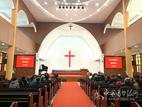After a 12-year study experience abroad (four years at a Christian university and eight years in seminary), I have some insights and reflections on studying theology abroad. I understand that many Christians in China are full of passion for the Lord, willing to give up everything at home to travel to a foreign country for the best theological education, which is indeed moving. However, I also see the severe shortage of workers in the church in China. On one hand, there is a need to study theological knowledge, but on the other hand, there is an urgent spiritual need at home. Adding to this is the fact that seminary education typically takes about four years. Going abroad for four years means at least a four-year absence from ministry in China. I have seen many pastors struggle with the dilemma of studying abroad versus staying home, many of them seeking God’s guidance in great pain. I would like to discuss this tension by combining my years of overseas study experience with the realities of today’s internet and artificial intelligence era, in order to propose the best solution for studying theology today.
Is Traditional Theological Education Still Relevant?
For most Christians and pastors, I believe that it is no longer necessary to spend four years studying theology abroad. The reason is that most people simply want to gain a comprehensive theological understanding, and for that, there are already mature online seminary courses available. You can now study theology online, either through free or paid programs. (I will provide a list of some free and paid websites at the end of this article for reference.) Most books in the field are already digitized and can be accessed or downloaded online. In addition, there are numerous theological resources available on the internet, and with the help of artificial intelligence, online theological studies are no longer a barrier. In fact, they may be faster, more efficient, and more comprehensive than traditional in-person learning.
The Rise of Online Theology Courses
Many people expect to study in physical seminaries abroad primarily to have face-to-face interactions with local professors or pastors, building personal relationships and spiritual growth. However, based on my more than ten years of study experience in the West, this might be a luxury. In Western culture and work schedules, professors and pastors often have office hours, meaning that most interactions are limited to one-hour appointments. After work, most people in Western culture live their own lives, rather than integrating life into a community as often happens in Eastern cultures. Therefore, I see little difference between in-person interactions and scheduling an online conversation. The latter is more cost-effective. Online seminary courses typically include several hours per semester of live interaction with professors for asking questions. If that is not enough, you can always contact the professors privately to schedule more time.
The language and cultural barrier is another major obstacle. I believe that life-on-life discipleship is a highly intricate process, like a Swiss watch, where every component must be perfectly aligned in a complex environment. The work of life-on-life discipleship is equally complex and requires precision, with language and culture being key components. If the language and cultural gap is too large, it becomes challenging to engage in high-quality discipleship.
The Benefits and Drawbacks of Studying Theology Abroad
To give a simple example, in China, it is customary to treat others when eating out, but in the West, even if you go out with a much older pastor or you are financially struggling, they will often follow a “split the bill” (AA) system. Even if you have a great conversation during the meal, when the pastor only pays for his own meal, it can cause cultural shock for many Chinese, and the effectiveness of life-on-life discipleship may be significantly reduced. This is just a simple example of cultural shock; real-life examples are much more complicated. Combined with language barriers, the effect of life-on-life discipleship overseas may be further diminished.
Another hidden issue, which many people do not consider, is the disconnection from one’s home church and even Chinese society after studying abroad for several years. Often, after several years of studying abroad, the congregation at home may have changed, and even the leadership in the church may have shifted. So, after several years abroad, returning home may not lead to a smooth transition back into ministry. In the worse cases, it may even be impossible to return to the original church for ministry, necessitating a search for new ministry opportunities. This does not even consider the time, money, energy, and opportunity costs of relocating.
Specialized Theological Fields that May Still Require Study Abroad
That said, there are indeed a few situations where studying theology abroad may still be suitable. These include:
- Wanting to study specialized subjects that are not available online: Some specialized theological subjects, such as advanced degrees (Master of Theology or Doctor of Theology) that focus on biblical languages like Greek, Hebrew, or Biblical Aramaic, or subjects like biblical archaeology, Christian special education, or those that require field study, may not be available online.
- Wanting to study local church or cultural practices: Some students are more interested in learning about the local church culture or institutional culture, which requires long-term observation and learning on-site rather than from books. If you want to focus on this, studying abroad might be an option. However, in my opinion, it’s not necessary to spend several years abroad. A better solution might be to take a study tour for a few weeks or months during a break, which could achieve the same goal.
- Having special reasons or a unique calling: Some Christians may have special reasons or callings that make it difficult to live in China, or they are more suited to studying abroad and serving overseas. This does not include those who want to emigrate for personal comfort or selfish reasons.
A Practical Solution: Online Learning for Chinese Christians
In summary, for most people, the best way to study theology today is online. Given the severe shortage of workers in China and the fact that we live in the era of the internet and artificial intelligence, it is no longer necessary to study theology abroad. On the contrary, in terms of learning knowledge alone, studying theology online from home can be faster, more efficient, and more convenient. Online learning also significantly reduces the costs mentioned above (time, money, energy, and opportunity costs). This model allows us to study theology while continuing to serve in our current positions, taking care of our existing churches and ministry needs, and seamlessly transitioning into future ministry. Isn’t this a win-win solution?
Reference Resources
Free
- Many seminaries, such as The Master’s Seminary, have made most of their courses freely available on YouTube, complete with auto-translated Chinese subtitles.
- Coursera
- Free courses in various disciplines, including theology, are available on this website. While many are offered by prestigious Western universities, only a few come from seminaries, meaning the content may lean towards more liberal perspectives. It’s important to exercise discernment when browsing and selecting.
Paid
Many seminaries now offer their courses online, enabling students to earn the same degrees as those attending in person. Here are two examples:
- Baptist—The Southern Baptist Theological Seminary
- Presbyterian—Westminster Theological Seminary
Editor’s note: This article was originally written in Chinese and was translated by the ChinaSource team.
Originally from Webpage 'ChinaSource'
CCD reprinted with permission












